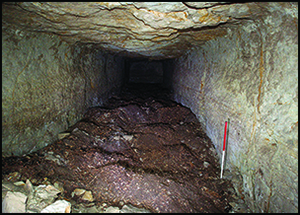Crossref Citations
This article has been cited by the following publications. This list is generated based on data provided by
Crossref.
McKnight, Lidija M.
Adams, Judith E.
Chamberlain, Andrew
Atherton-Woolham, Stephanie D.
and
Bibb, Richard
2015.
Application of clinical imaging and 3D printing to the identification of anomalies in an ancient Egyptian animal mummy.
Journal of Archaeological Science: Reports,
Vol. 3,
Issue. ,
p.
328.
Hayden, Brian
2018.
The Power of Ritual in Prehistory.
Detry, Cleia
Cardoso, João Luís
Heras Mora, Javier
Bustamante-Álvarez, Macarena
Silva, Ana Maria
Pimenta, João
Fernandes, Isabel
and
Fernandes, Carlos
2018.
Did the Romans introduce the Egyptian mongoose (Herpestes ichneumon) into the Iberian Peninsula?.
The Science of Nature,
Vol. 105,
Issue. 11-12,
Atherton-Woolham, Stephanie
McKnight, Lidija
Price, Campbell
and
Adams, Judith
2019.
Imaging the gods: animal mummies from Tomb 3508, North Saqqara, Egypt.
Antiquity,
Vol. 93,
Issue. 367,
p.
128.
Raymond, C. A.
Bevitt, J. J.
Tristant, Y.
Power, R. K.
Lanati, A. W.
Davey, C. J.
Magnussen, J. S.
and
Clark, S. M.
2019.
Recycled Blessings: An Investigative Case Study of a Rewrapped Egyptian Votive Mummy Using Novel and Established 3D Imaging Techniques.
Archaeometry,
Vol. 61,
Issue. 5,
p.
1160.
Marey Mahmoud, Hussein H.
and
El-Badry, Abdelhakim
2020.
Physicochemical characterization of building and painting materials from the Ptolemaic Osirian catacombs of Karnak temples, Upper Egypt.
The European Physical Journal Plus,
Vol. 135,
Issue. 9,
Ikram, Salima
2020.
The Handbook of Mummy Studies.
p.
1.
Ikram, Salima
2021.
The Handbook of Mummy Studies.
p.
629.
Woodman, Neal
and
Ikram, Salima
2021.
Ancient Egyptian mummified shrews (Mammalia: Eulipotyphla: Soricidae) and mice (Rodentia: Muridae) from the Spanish Mission to Dra Abu el-Naga, and their implications for environmental change in the Nile valley during the past two millennia.
Quaternary Research,
Vol. 100,
Issue. ,
p.
21.
Woodman, Neal
Ikram, Salima
Rowland, Joanne
and
Spigelman, Mark
2021.
A new addition to the embalmed fauna of ancient Egypt: Güldenstaedt’s White-toothed Shrew, Crocidura gueldenstaedtii (Pallas, 1811) (Mammalia: Eulipotyphla: Soricidae).
PLOS ONE,
Vol. 16,
Issue. 4,
p.
e0249377.
Rothschild, Bruce M.
2021.
Consistent Prevalence of Spondyloarthropathy Over 2300 Years: Ancient Egyptians and the Synchronic Baboon Catacomb.
Evolutionary Biology,
Vol. 48,
Issue. 4,
p.
394.
Nicholson, Paul T.
2022.
Sacred Animals at Saqqara.
Heritage,
Vol. 5,
Issue. 2,
p.
1240.
Dosoo, Korshi
2022.
Magikon zōon.
p.
339.
Woodman, Neal
Ikram, Salima
and
Rowland, Joanne
2022.
Environmental implications of Ptolemaic Period rodents and shrews from the Sacred Falcon Necropolis at Quesna, Egypt (Mammalia: Muridae and Soricidae).
BMC Ecology and Evolution,
Vol. 22,
Issue. 1,
Belova, G. A.
Khasanov, B. F
Krylovich, O. A.
Ikram, S.
Vasyukov, D. D.
and
Savinetsky, A. B.
2024.
A Pack of Hounds and its Master? A Bi-Species Burial from the Necropolis of Deir El-Banat (Fayum).
Archaeofauna,
Vol. 33,
Issue. 1,
p.
81.



